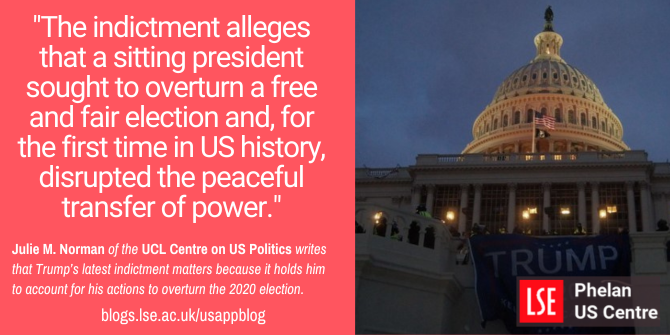 On 3 August, former Donald Trump will appear in court to face his third arraignment, becoming the first former president to face federal charges for actions allegedly taken during his time in office. In this article, Julie M. Norman breaks down what to expect and why this indictment carries so much weight.
On 3 August, former Donald Trump will appear in court to face his third arraignment, becoming the first former president to face federal charges for actions allegedly taken during his time in office. In this article, Julie M. Norman breaks down what to expect and why this indictment carries so much weight.
What are the charges?
Former President Donald Trump has been charged with four felony counts related to his alleged efforts to overturn the 2020 election. The charges include conspiracy to defraud the United States by obstructing an election, conspiracy and obstruction of the official Congressional proceeding on January 6, and conspiracy against the rights of the American people to have their votes counted.
Notably, the indictment is not limited to the specific events of January 6, and does not include a charge of incitement related to the storming of the Capitol. Rather, it encompasses the two-month period following the general election in November 2020 when Trump and allies were allegedly employing a variety of strategies to overturn the election. Further, the indictment is clear that the charges are not about what Trump said during this period, but rather about the specific actions he took to attempt to change the election results.
Why is this indictment so important?
This indictment is different from previous charges related to classified documents and hush money payouts because it is ultimately about democracy. The indictment alleges that a sitting president sought to overturn a free and fair election and, for the first time in US history, disrupted the peaceful transfer of power.
The fact that Trump is now the frontrunner for the Republican nomination for the 2024 election complicates the political optics, but the Special Counsel, Jack Smith, deemed that the alleged crimes were serious enough, and the evidence compelling enough, to pursue the charges. Like the previous federal charges, these charges carry the possibility of significant prison time if convicted.
What will be Trump’s likely defense?
Trump will have two stages to make his defense — a federal courtroom, and the court of public opinion. In terms of the latter, Trump has claimed that the indictment is just one more attack against him in a politically motivated witchhunt, going so far as to compare the US to Nazi Germany or a Communist dictatorship. This narrative of persecution has become central to Trump’s campaign, and so far has resonated with his base.
But defense in a court of law will be necessarily different, and will likely focus on the extent to which the prosecution can prove that Trump knew his claims were indeed lies. While the indictment — and the January 6 House Committee hearings — laid out that Trump knew he had lost the election, proving that in court may be more difficult. Other defense approaches may include claiming that Trump was simply following the advice of his lawyers at the time, several of whom are believed to be the unnamed co-conspirators in the indictment.

“Capitol” (CC BY 2.0) by Tyler Merbler
What will happen next?
Special Counsel Jack Smith is seeking a speedy trial, but the date is still likely months away. It will ultimately take place in Washington, DC, with Judge Tanya Chutkan, an Obama appointee, presiding.
Trump already has court dates in March and May 2024 from the previous indictments, and yet another indictment is expected regarding Trump’s alleged actions to overturn election results in the state of Georgia. That means that Trump could be facing up to four trials in 2024, coinciding with the spring primary season when the Republican nominee is selected, and/or the general election.
How will this affect the 2024 election?
An indictment — and even a conviction — does not preclude Trump from running for President. And he still maintains a commanding lead over the rest of the Republican field, which has only widened since the indictments began in the spring.
His Republican rivals have offered mixed responses to the latest indictment, ranging from promises of a pardon to direct criticism. But most know they have little chance of capturing the nomination without the support of Trump supporters, most of whom have stayed loyal to the former president. And the ongoing trials will keep the focus on Trump throughout the primaries.
The charges won’t help Trump in a general election, which will likely hinge on moderates and independents in key swing states. But, with Trump and Biden effectively tied in a potential rematch, the court of public opinion could end up having the final word.
- Please read our comments policy before commenting.
- Note: This article gives the views of the author, and not the position of USAPP – American Politics and Policy, nor the London School of Economics.
- Shortened URL for this post: https://bit.ly/3q9Ay1k






